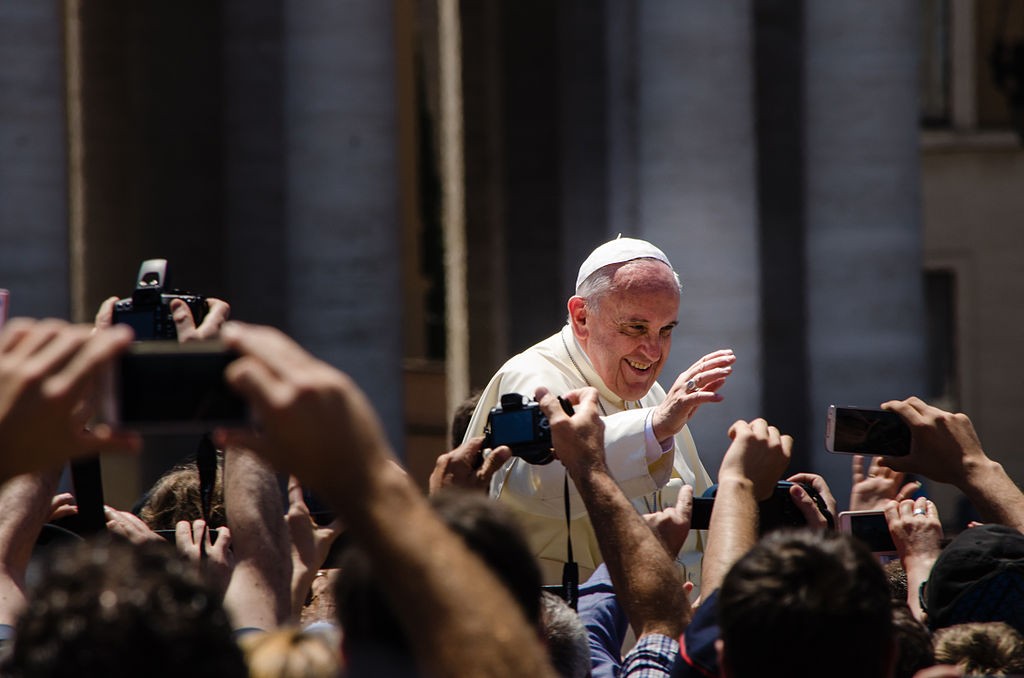Pope Francis, continuing with his trend of pushing boundaries in the Catholic community, announced in October 2014 to the Pontifical Academy of Sciences that he believes in evolution, to a certain extent.
Pope Francis, originally Cardinal Jorge Mario Bergoglio of Argentina, was elected Pope on March 13, 2013 at 76 years old. He is the first Jesuit and the first non-European Pope of the Roman Catholic Church in over 1,200 years.
Since his election, Pope Francis has taken progressive stances on issues such as divorce, gay marriage, and the definition of a Catholic family.
In a CBS television appearance, Pope Francis said, “A person’s identity, respect, the dignity and love that he or she deserves, does not depend on anything—sexual orientation, how much money we’ve got, if we’ve got a green card or immigration papers, if we’ve got a stock portfolio. It doesn’t depend on anything other than the fact that we’re a child of God, made in his image.”
This stance contrasts greatly with Pope Francis’s predecessor, Pope Benedict XVI, whose attitude towards gay people was harsh and unaccepting.
In January 2015, Pope Francis named 15 new cardinals from 14 countries to the Roman Catholic Church, extending his attempts to diversify Church hierarchy.
Many of the new archbishops and bishops represent developing countries such as Myanmar, the Cape Verde islands, and Tonga. Uncharacteristic of the Roman Catholic Church, only five Europeans were recently nominated.
A New York Times article detailing Pope Francis’s attempts at globalizing the church said that the Church now “really is universal, it’s [no longer] just a reflection of Europe.” Coordinator of Vatican Insider Andrea Tornielli added, “Francis’s vision is of a truly universal church attentive to all the peripheries of the world.”
Pope Francis continues to address controversial issues in the Catholic community with his recently released statement that evolution, in fact, exists to a limited extent.
In October 2014, in his address to the Pontifical Academy of Sciences, Pope Francis stated that God was “not a magician,” but “the Creator who brought everything to life.”
However, Francis said God did not create all living things in the way they currently exist. Francis said God “created human beings and let them develop according to the internal laws that he gave to each one so they would develop, and reach their fullness.”
The theory of the origination of the world through the Big Bang, Francis stated, “does not contradict the creative intervention of God.” The theory of evolution, he assures the Catholic Church, does not contradict biblical teachings.
Pope Francis, in his acknowledgement of evolution, is “respecting the independence and integrity of scientific inquiry,” said Kenneth Miller, a professor of biology at Brown University, to the New York Times.
Pope Francis acknowledges the existence of evolution as guided by God, and draws a connection between the Bible and the theory of the Big Bang.
To the Pontifical Academy of Sciences, he explained that “the Big-Bang, that is placed today at the origin of the world, does not contradict the divine intervention but exacts it. The evolution in nature is not opposed to the notion of Creation, because evolution presupposes the creation of beings that evolve.”
Pope Francis does not share the exact same beliefs regarding controversial issues as those that have been believed by previous Popes, nor does he waltz in to the Roman Catholic Church with opposing beliefs. Rather, he combines traditional beliefs with an open-mindedness regarding science, social issues, and the global community.
Pope Francis is, it seems, the definition of progress in a position of power: welcoming new ideologies while still not forgetting tradition. He seems to be on a path of acceptance and respect of different convictions in the Catholic Church, which might set a trend for future religious leaders.
Pope Francis closed his address by saying, “At the conclusion of your Plenary Session, dear Academicians, I am happy to express my profound esteem and my warm encouragement to carry forward scientific progress.”




